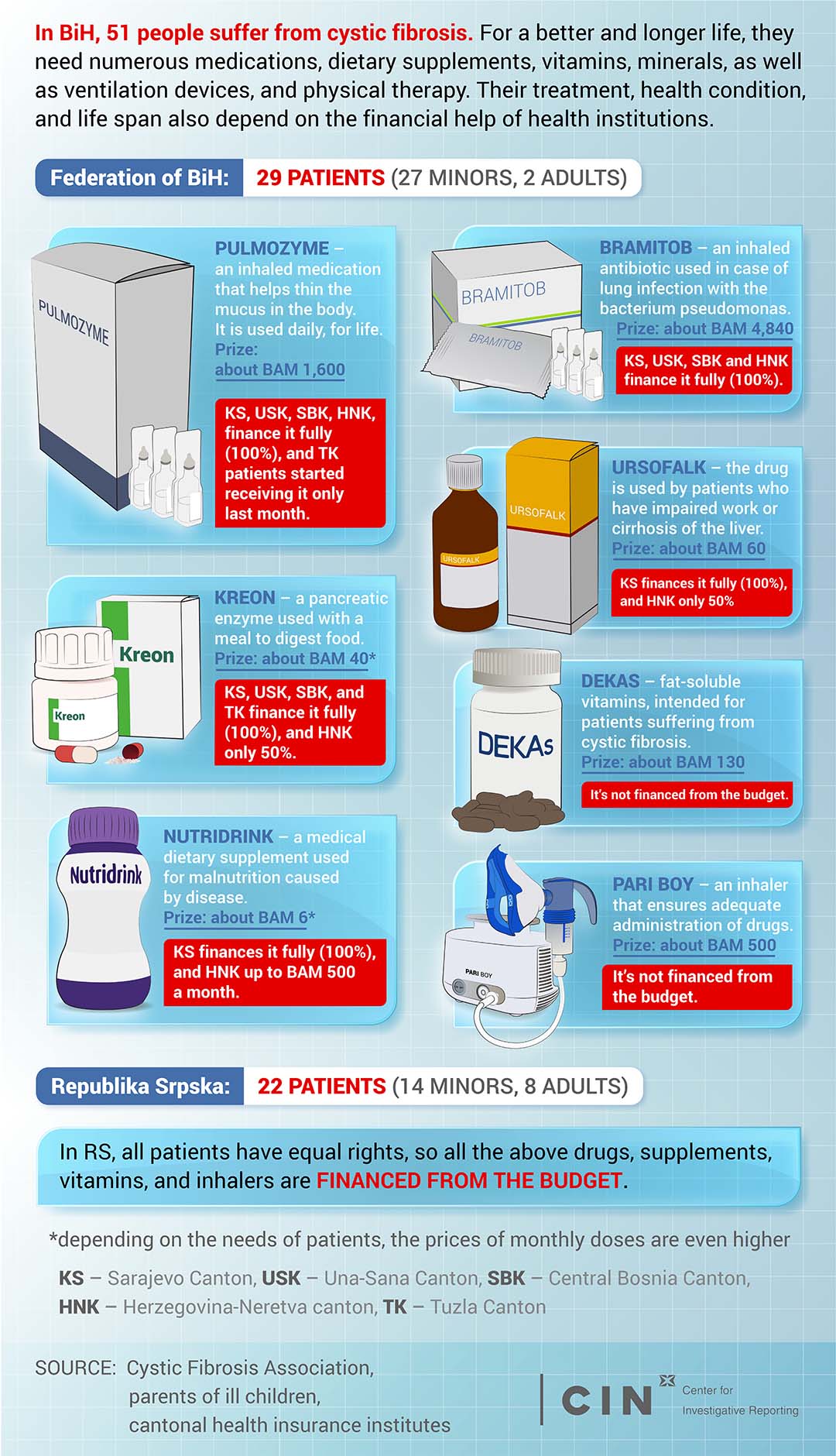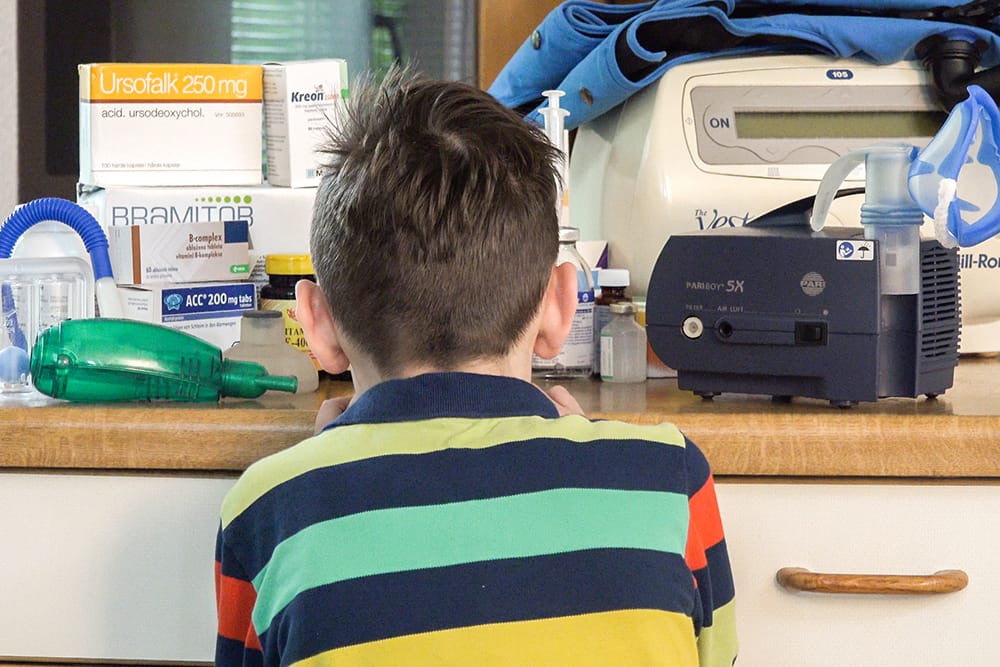A day without medicine is a life one day shorter. This is how Almedina Semanić from Cazin described the importance of the medicine that her thirteen-year-old son must take every day to alleviate the symptoms of cystic fibrosis.
If not treated regularly, this disease may culminate in infections, pneumonia, and breathing problems, and the resulting accumulation of thick secretions leads to failure of other organs as a result of which the whole organism gets tired and weak. Irregular therapies shorten the life span of the patients.
Seven children from the Una-Sana Canton (USC) have been waiting for half a year for the Cantonal Health Insurance Institute to approve medicines that cost more than six thousand BAM a month.
This is not the only time they waited for the medications, but it is so far the longest. Their parents told CIN that the medications are coming with at least a month or two delay each year. In addition, the Institute requires them to submit extensive medical documentation each month confirming their children’s incurable disease.
While waiting for bureaucratic approvals, parents have been exploring various ways to ease their children’s pain without medication – ventilation using a sterile mixture of salt and water or borrowing medication from parents from other places.
“We can tell the difference in the way he coughs, it is horrible. The symptoms are so intensified. Simply, you can see the difference, you can see that he misses it”, describes Semanić.
In Bosnia and Herzegovina, 51 patients suffer from this rare disease. Their treatment, health condition, and life expectancy depend on the part of the country in which they live. As early as 2014, both Entities adopted strategic documents that were supposed to improve and equalize the health care of patients suffering from rare diseases. Those suffering from cystic fibrosis in the Republika Srpska (RS) have all the necessary therapy provided at the expense of the budget, while in some cantons of the Federation of Bosnia and Herzegovina (FBiH) they have neither assistance nor basic medicines.
Monthly proof of lifelong illness
Ten days after the birth, Benjamin Semanić developed double pneumonia, and after six months of examination and antibiotic therapy, he was diagnosed with cystic fibrosis. This was the first time for his mother Almedina Semanić to hear about the disease. The child was taken to Zagreb, Bihać, Sarajevo, Banja Luka, Tuzla, and Belgrade for checkups and treatments.
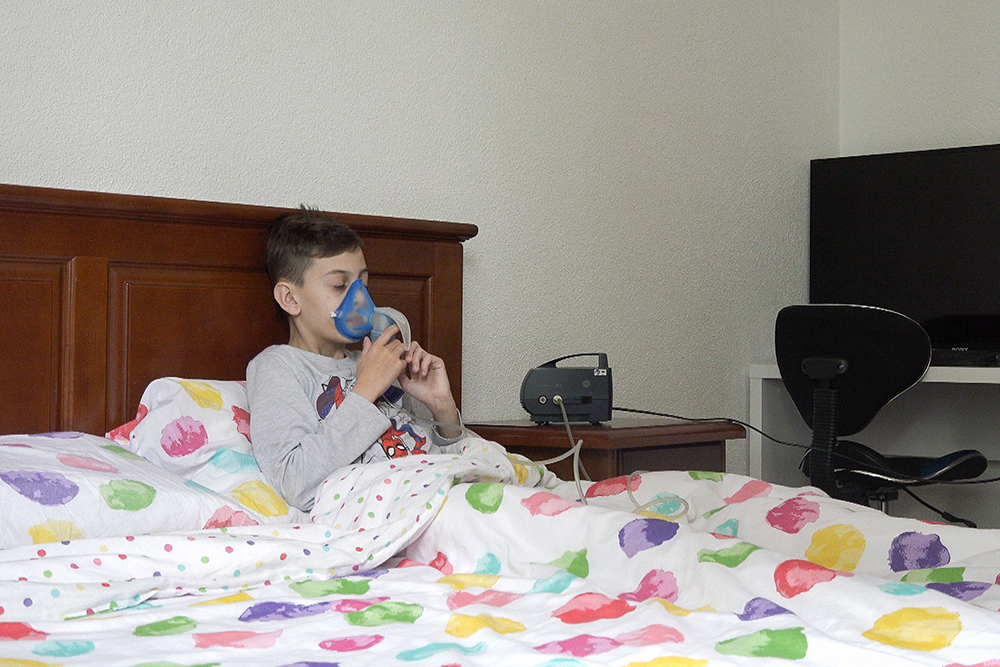
Cystic fibrosis is a rare, chronic, and incurable disease that attacks almost all organs. Pneumonia weakens the body, patients are malnourished, and all this causes a poorer oxygen supply to the brain and loss of concentration and memory, explained Muris Halkić, pulmonologist and Minister of Health at the USC for CIN reporters: “Not being able to breathe, not having enough air is the worst possible thing.”
To prevent the deterioration of organs drowned in mucus, patients must take Pulmozyme, an expensive drug, on a daily basis. Semanić claims that the drug brings relief to her son: “Ventilation with Pulmozyme every day clears his lungs and he is simply calm. At night, when he sleeps, it’s easier for him.” But this is not the only medicine he needs. Due to the bacteria that attack his lungs, Benjamin takes the antibiotic Bramitob along with other drugs and preparations.
Monthly therapy with these two drugs costs around BAM 6,500, and in the Una-Sana Canton, they should be paid for by the Health Insurance Institute. However, Benjamin and six other children waited six months for the Institute to approve the drugs to which they were entitled. During this time, the health condition of some has deteriorated.
According to the Special Health Care Program, each month patients are required to submit to the Institute’s commission the very same set of papers – a request for approval of medication and documentation proving that they need the medication, a letter of discharge from the Sarajevo Clinical Center (UKCS) indicating the therapy, a prescription from the health center, the opinion of a doctor from the Cantonal Hospital and a Pro-forma invoice from the pharmacy in Bihać. As soon as they submit the request, the parents immediately start collecting the very same papers for the next month.
“Once diagnosed with cystic fibrosis, the child will have it next morning, and the day after and he had it yesterday, it is permanent”, explains Zemira Ćerimović, the mother of the sick boy from Velika Kladuša.
The budget of the Institute annually plans about half a million BAM for financing 26 drugs under the Special Program, including those for cystic fibrosis, which are financed throughout the year. However, the parents of the children interviewed by CIN reporters claim to have never received medication for all 12 months.
“We can’t say that we didn’t receive them, but we are fed up with them saying ‘you have not submitted it by the 15th’, ‘don’t submit it now for this month, do it for the next month’. Why? If he is entitled to 12-month [medication], why does he get it for 10 months only? Because of some deadlines! What deadlines?”, asks the parent Ramiz Ćerimović. And when the Institute finally approves the drugs, parents often have to wait for the pharmacy to procure them, which makes it even more difficult for children fighting the disease.
The parents claim the Institute has been informing them by phone that they would not receive the medicine for a certain month or that they were late with the submission of documentation, but they have never received a written explanation as to why the medicine was not approved.
Officials from the Institute did not want to discuss this topic with CIN reporters nor did they answer what the money that was not given for medicines was spent on.
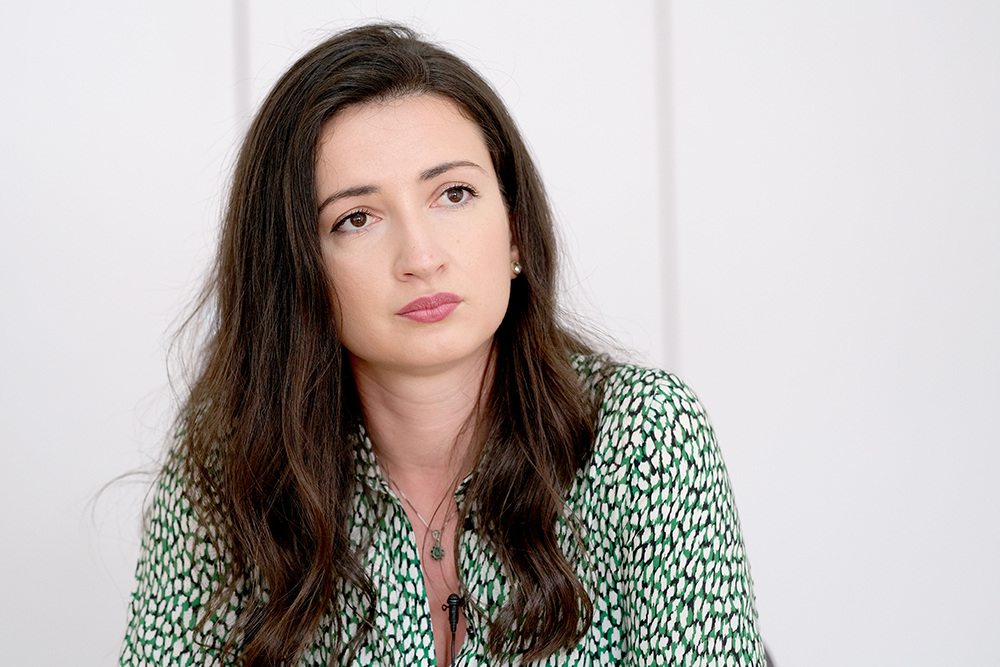
To help parents and children, the Cystic Fibrosis Association of BiH hired lawyers in January this year who submitted requests for approval of medications on behalf of the parents. For two months the Institute ignored their requests, only to reply in March claiming that they have no right to represent the patients and that the documentation submitted with the requests was incomplete. The parents were given a three-day deadline to state whether they still needed the medication.
“I am afraid again. I am afraid of her relapsing because she will be lacking Bramitob for two days. In a week she won’t be having any Pulmozyme. There is no one here to lend it to me because the other children do not have it either”, explained Amra Smajić from Cazin, the mother of a sick girl.
Meeting of the officials following a call from reporters
The USC Health Insurance Institute changed six directors in a year and a half. Former director Izet Mustafić was removed from office in May this year, and he claims to have been “only signing the replies” for the lawyers of the Association, which were prepared by the Legal Department. While politics was busy dismissing and appointing directors, the Institute ignored its obligations, leaving children to wait for the lifesaving medicines.
After an interview with CIN reporters, the acting director of the Institute, Almir Lipovača, and Minister Muris Halkić discussed these problems. “Rest assured that the issue will be resolved in the next month,” said Minister Halkić, adding that he will try to facilitate the procedure for obtaining medication so that patients do not have to submit the same documentation every month: “It is absurd to have the commission consider every month whether this request is justified. The disease is chronic and incurable.”
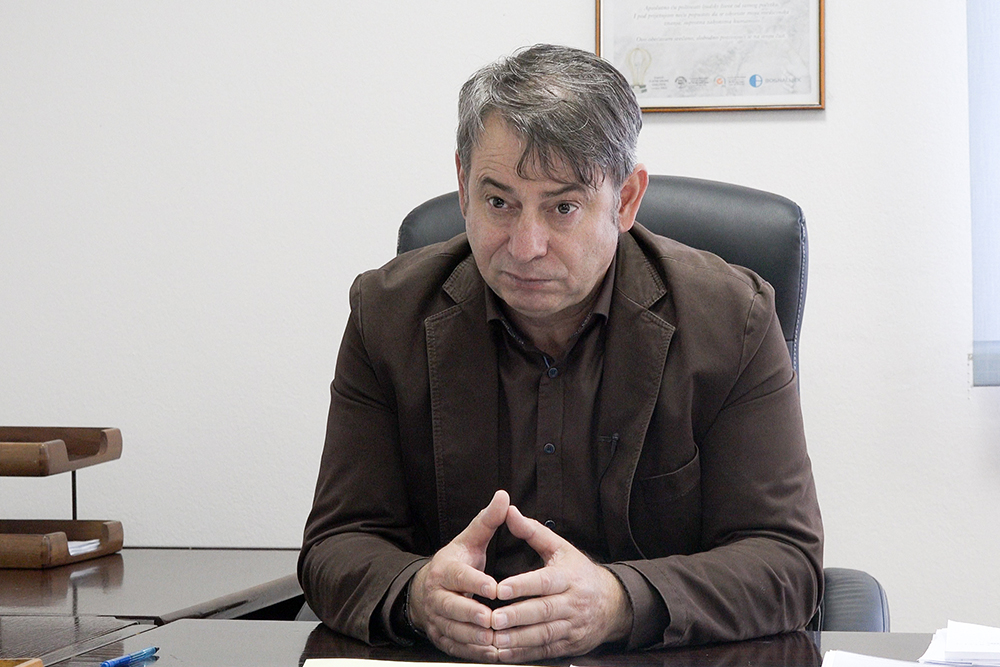
At the beginning of June, at the request of a lawyer, the Institute approved the medication for the previous month, but the children were not compensated for the other skipped therapies. The officials from the Institute claim to have approved the medicines because the lawyers this time submitted complete documentation, but the Association claims that they have submitted the same documents before.
The Institute refused to provide CIN with information on Commission members, their fees, and the number of sessions held. According to the official report, in 2020, BAM 60 thousand were paid for the work of the commissions of the Institute.
“As far as I can see, the biggest success for them is when someone says ok, that’s enough, and take their child across the border. (…) I think for them it is the reason to celebrate. It means, they have one beneficiary less on the budget”, commented Ćerimović, the father of a sick child. In the last few years, five children suffering from cystic fibrosis from the USC have left the state with their parents.
Unequal rights in the state
When Mirela Delalić from Cazin found out that her baby had cystic fibrosis, the doctor asked her: “Do you know that their life span is only three years?” Today, her son is eight years old.
Wanting to provide them with better treatment, in January this year she moved to Germany with two children suffering from cystic fibrosis: “It is not about one drug. There is a whole bunch of drugs that our children needed.”
In addition to numerous medicines and vitamins they purchased themselves, they were also buying those that should be provided by the Institute: “We cannot afford to wait for three months for someone to give us the therapy, while our children wait and suffer”, says Delalić.
Children suffering from cystic fibrosis must be ventilated up to five times a day, they need quality inhalers to ensure proper intake of medication and various devices for physical therapy, breathing exercises, and successful expulsion of mucus from the body. In FBiH, all this is financed by the parents themselves.
“When he feels not too bad, on average, the costs were around a thousand BAM.” If it wasn’t for the help of friends, the costs would have exceed ten thousand BAM, explains Delalić. “They really need a lot more than bread and water.”
While in their own country they fought for medicines and lived in uncertainty, in Germany they exercise their right to treatment without any difficulty. According to Delalić, it took only a letter from UKCS, translated into German: “Now we have no costs, thank God, nothing. (…) I am thrilled now that we are here. I love Bosnia and all that, but people in Bosnia do not care about children like this.”
Due to the different rights exercised through health insurance, the health condition and life span of patients with cystic fibrosis depends on the part of BiH in which they live. There are 29 patients in FBiH and 22 in RS.
Patients in the RS regularly receive the necessary medication, and the costs for the purchase of vitamins, dietary supplements, and inhalers are reimbursed from the public budget. “There have been no delays or skipped therapies in the last three years,” said Biljana Kotur, mother of a child with cystic fibrosis and president of the RS Rare Diseases Association.
In 2014, the FBiH Government adopted the Rare Diseases Strategy to improve patient health care. The implementation of the Strategy was to be financed partly from the FBiH budget and partly from the cantonal budgets. However, even seven years later, cystic fibrosis is not defined as a disease in the regulations of this Entity nor are the necessary medications financed from the budget.
According to data from the Cystic Fibrosis Association of BiH, the average life expectancy of patients in FBiH in the last ten years was up to fifteen years, while in developed countries with adequate therapy they can live a good quality and functional life up to 70.
The FBiH Ministry of Health ignored the questions from CIN reporters on this subject matter.
Due to negligence of the Entity, everything is left to the cantons, and their practices vary. According to the data from the Association, children in Sarajevo receive medication Ursofalk free of charge, while in the USC and Herzegovina-Neretva cantons parents pay half the price, and parents in the Central Bosnia Canton pay the full price. This medicine is prescribed for children who have deteriorated function of the liver or chronic liver disease due to the main disease, but the mother of a boy from Tuzla Canton whose illness led to liver problems says that this medicine has not been prescribed to him so far.
Dr. Mensuda Hasanhodžić, who has been treating three children in this canton, says that she is prescribing the medicine based on the patient’s parameters and condition. “No medicine should be prescribed unless necessary. If Ursofalk is not needed, it should not be administered.“
The therapy of basic drugs, dietary supplements, fat-soluble vitamins prescribed to patients in Tuzla Canton differs from the therapy in other cantons and the Republika Srpska. In Tuzla canton, the patients have only had the opportunity to use Pulmozyme since last month. Dr. Hasanhodžić says she does not prescribe drugs that she knows patients cannot get in pharmacies. These include Pulmozyme and Bramitob. “They can come to the hospital to get the medicine if we have it. And why we do not have it – you should ask this question to the director of the Clinical Center”, says Dr. Hasanhodžić.
Meanwhile, patients in Tuzla Canton are finding ways to cope. They connected through social networks with parents from Serbia and Croatia who have been sending them the necessary therapies for years, which Dr. Hasanhodžić does not prescribe. “I can’t go beyond what is prescribed in this canton,” she told CIN.
Mirela Delalić from Cazin recalls that her boy was prescribed an adequate dose of enzymes to break down food only when they moved from Tuzla to Sarajevo for treatment. “I will not comment. I follow the recommendations written in Creon (medicine, author’s note) “, said for CIN dr. Hasanhodžić, adding that every year she writes programs for the necessary medicines, as well as requests on behalf of patients, which she sends to the management of the Clinical Center for Drug Reimbursement at the Cantonal Institute.
Only in Sarajevo Canton are parents exempted from submitting requests and documentation for dispensing medicines. In addition to basic medicines, children are given the necessary high-calorie liquid food free of charge. Here, there is no limit that the Ćerimović family from Velika Kladuša will face next year when their son comes of age. Namely, the Decision regulating the financing of expensive medicines through the Health Insurance Institute of USC stipulates that this right is to be enjoyed by children up to 18 years of age. Unless the Decision is changed, their son will no longer be able to receive medication at the expense of the budget.
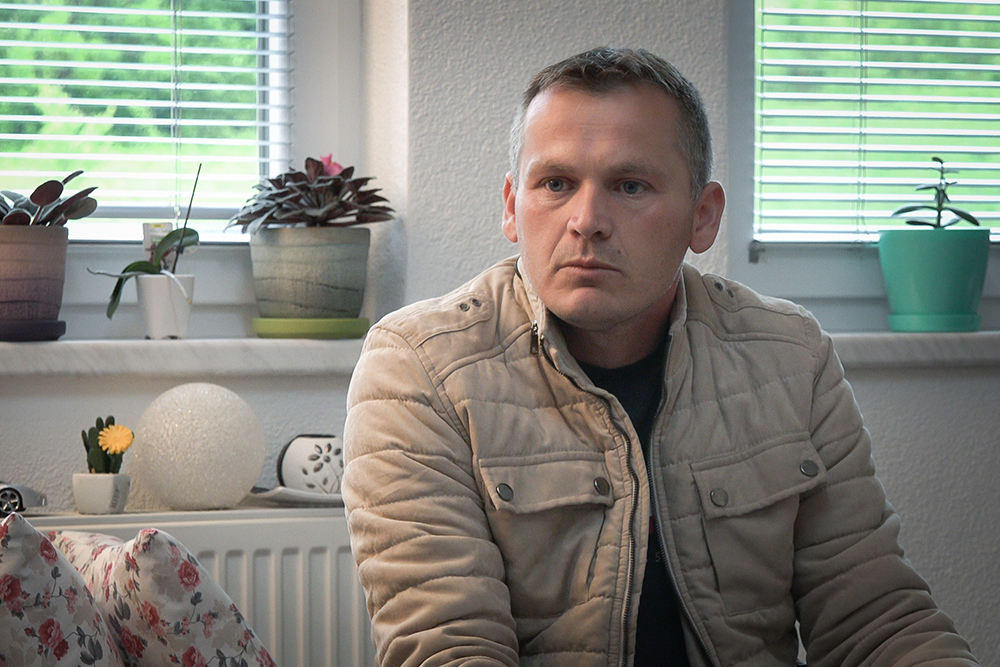
In Sarajevo Canton, this restriction has been abolished in April 2020. Twenty-five-year-old Emina Kadrić, one of the two adult patients who lives here, claims to have not been prescribed any medicine nor she used any since. “What sense does it make to use it for five days and then I do not have it for the next 15 days? There’s no use.” Officials from the Sarajevo Canton Health Insurance Institute explained to the BiH Cystic Fibrosis Association that the medications have not been dispensed because the Institute has problems reaching out to the doctors and training them to render e-prescriptions. They did not respond to a CIN inquiry.
In RS, patients do not have such restrictions. Eight adult patients have the same rights as minors. “Adequate treatment and monitoring and the availability of medicines in recent years have definitely improved the lives of patients,” says Kotur.
Although she lives in the same country, her optimism cannot be shared by Amra Smajić from Cazin. Numerous bureaucratic hurdles give her an additional reason to worry about her child’s future: “In five, ten, twenty years, what these children will look like? Will they live that long? Will it be any better? I do not know.“
